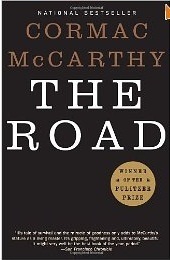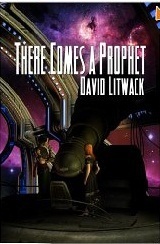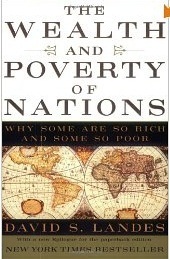A Different Kind of Dystopia
Dystopian novels have become popular in the YA market. Although I’m not a huge fan of burned-out worlds, where people scrabble for food in hollow shells of cities, I found David Litwack’s There Comes a Prophet different and positive.

 The urge to write first struck David when working on a newsletter at a youth encampment in the woods of northern Maine. Using two fingers and lots of white-out, he religiously typed five pages a day throughout college and well into his twenties. Then life intervened in the way life does, with creating businesses and raising a family becoming his first priorities. When he found time again to daydream, the urge to write returned.
There Comes a Prophet
is his first novel in this new stage of life. He no longer limits himself to five pages a day and is thankful every keystroke for the invention of the word processor.
The urge to write first struck David when working on a newsletter at a youth encampment in the woods of northern Maine. Using two fingers and lots of white-out, he religiously typed five pages a day throughout college and well into his twenties. Then life intervened in the way life does, with creating businesses and raising a family becoming his first priorities. When he found time again to daydream, the urge to write returned.
There Comes a Prophet
is his first novel in this new stage of life. He no longer limits himself to five pages a day and is thankful every keystroke for the invention of the word processor.In this blog post, David describes the inspiration for the book, and how he sees the dystopian world.
Q: How do you see a dystopian world?
A: I think there are three kinds of dystopia:
1) Power driven - the evil one has come to power and is doing bad things (1984, The Hunger Games, Voldemort in the Harry Potter series).
2) The world destroyed. Following some kind of holocaust, society has devolved into chaos (Mad Max, Cormac McCarthy's The Road).
3) Dystopia has been brought on by good intentions.
 I find the first two to be too black and white and less interesting. They're also too bleak, leaving little room for hope.
There Comes a Prophet
is of the third variety. The founders of the Temple were trying to make the world better. The arch vicar really believed denying the quest for knowledge is not as bad as the consequences of too much knowledge. The book grapples with that premise, leaving open whether it may be true or not. But the innate need of the individual to evolve and grow triumphs over fear.
I find the first two to be too black and white and less interesting. They're also too bleak, leaving little room for hope.
There Comes a Prophet
is of the third variety. The founders of the Temple were trying to make the world better. The arch vicar really believed denying the quest for knowledge is not as bad as the consequences of too much knowledge. The book grapples with that premise, leaving open whether it may be true or not. But the innate need of the individual to evolve and grow triumphs over fear.Q: What sparked your ideas in your novel?
A: As far as insight as to how I came up with the ideas, I've been fascinated by militant groups that condemn the modern world and its obsession with technology, to the point of refusing to allow science to be taught in their schools. Yet at the same time, their entire movement relies on modern medicine, transportation, and communications.
I read a wonderful non-fiction book called The Wealth and Poverty of Nations: Why Some Are So Rich and Some So Poor by David S. Landes. It talks about how Portugal and Spain were economic peers to France and Britain in the 16th century. Then they chose to become rigid theocracies, freezing their cultures and worldviews so their societies stagnated. At the same time, France and England were going through the reformation and the enlightenment. Within a hundred years, their societies had totally eclipsed those of Portugal and Spain.
 I tried to show this phenomenon through the eyes of three precocious young people who wanted more from life but lived in a world of limits. They were unwilling to challenge the status quo until they learned, partially by accident, how much was possible.
I tried to show this phenomenon through the eyes of three precocious young people who wanted more from life but lived in a world of limits. They were unwilling to challenge the status quo until they learned, partially by accident, how much was possible.Q: What question has never been asked about your book?
A: No one has yet asked me where the title came from. The title, and its full quote from the book of light, are a paraphrase of Deuteronomy 13:1-6, which begins: “If there arise among you a prophet, or a dreamer of dreams, and giveth thee a sign or a wonder… saying, Let us go after other gods, which thou hast not known, and let us serve them; Thou shalt not hearken unto the words. And that prophet, or that dreamer of dreams, shall be put to death.”
Thanks for those compelling insights into your novel. Here’s my review.
Nathaniel, Orah, and Thomas, best friends since childhood, live a peaceful, bucolic existence in Little Pond, a place as small as its name suggests. Their lives are simple, governed by the teachings from the Temple, and the ministrations of the Vicars and their squadron of Deacons. Hints of the past, the ‘darkness’, are resolutely squashed by the Vicars who explain that to doubt is to reject the ‘light’ of their teachings. Subsequently, the perceived ‘magical’ elements of the past are crushed in favor of so-called mystical teachings. For a thousand years, this peaceful existence continues. Nevertheless, secrets have a way of revealing themselves. Nathaniel doesn’t accept the Vicars’ teachings; he believes there is more to life. A legend exists of earlier magic, hidden away in a place called the Keep. The secret path to the Keep has been preserved by Keepers, who will pass on the clues to a group called Seekers. But of course no one dares question the Temple, until Thomas is taken away for a ‘teaching,’ and comes back broken in mind and spirit. Seeds of rebellion grow in Nathaniel, and come to fruition when his friend Orah is taken. Determined to save her, Nathaniel ends up in the prisons of Temple City, and finds out the truth from a long-time prisoner. Armed with knowledge, he sets forth with Thomas and Orah to find the Keep. Can they survive the journey, and can they inspire their people to realize the truth behind the Temple? Will the fulfilment of their mission destroy their world?
Author David Litwack has created a believable dystopian world devoid of technology. Technology overtook humanity (perhaps a salutary lesson here?), and led to social collapse. Hints of the hideous effects of indoctrination in a totalitarian society remind us of the dangers of the suppression of knowledge. This is a coming-of-age story, a tale of friendship and loyalty, and of self-discovery and self-belief. Each of the friends discovers their own talents, and with that, their purpose in life. The author takes a philosophical approach and engages readers in ideas of freedom and choice, both personal and of thinking. This is such a well-written book, with so many thought-provoking ideas that I am sure readers will thoroughly enjoy it and appreciate the author’s message.
Published on August 15, 2012 23:47
No comments have been added yet.



